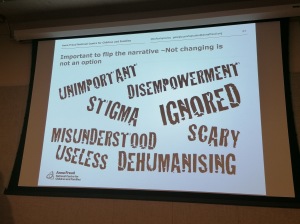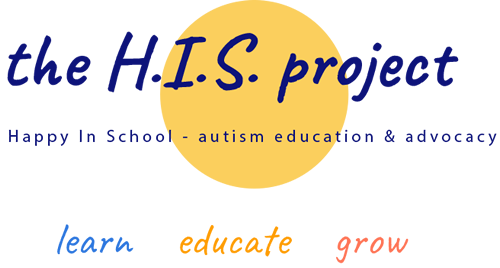Firstly autism is not a mental health disorder; it’s a neurological condition that affects the brain. Autistic people are different, but that difference need not be a disadvantage. Read that again. Autistic people are individual and their autism presents itself as uniquely and individually as they are. In my opinion, a person’s autism is so unique and individualised, it is easy to misunderstand or label it as something else.

How many doors do you have a push against to get help?
Autistic people, experience cruelty and unkindness because of their difference, and it is this persistent unkindness and enforcement of trying to conform to a set of behaviours that are not inherently ‘natural,’ that creates mental health difficulties. Experiencing sustained discrimination and in some cases overt dislike can create trauma in an individual. Many autistic people will attest to a series of experiences in their formative years that amount to trauma so damaging, they slip into a pattern of psychological distress which can significantly destabilise them, impairing their quality of life.

Some of the reasons why autistic people develop mental health issues
Getting mental heath support for children & young people with autism
I recently attended a 2-day course at the Anna Freud Centre, on Improving Access to Psychological Therapies (IAPT), for children and young people with autism. I’m aware this is a big issue from my own experiences and from the anecdotal evidence I hear when I meet parents in my #happinschool project workshops.
The course audience was ‘frontline’ staff, i.e. those working in mental health services, teaching, social care sectors including practitioners from CAHMS, Educational Psychologists, SENCOs, clinical psychologists and other professionals in the world of SEN, specifically autism.

Childhood mental health issues are increasing
An escalating issue
In 2013/14 there were 51,000 referrals of 15–19-year-olds to psychological therapies, with referrals for young women double the number of referrals for young men. New referrals to Improving Access to Psychological Therapies (IAPT) services for under 18s show an upward trend. (Mind, Source: Health & Social Care Information Centre (2015), Focus on the health and care of young people).
The course was designed by Dr Georgia Pavlopoulou – who is currently leading the module focusing on Improving Access to Psychological Therapies (IAPT). She is also a UCL Senior Teaching and Research Fellow. She showcased a range of material and presentations from autistic professionals and academics, including Ann Memmott, (Autistic Autism Professional & Speaker), Dr Damian Milton, (Lecturer at University of Kent, National Autistic Society, Autism knowledge and expertise consultant) Jo Billington, PhD candidate, Associate Lecturer in Special Needs at Oxford Brookes School of Education & Service User and Jon Adams, Autistic Autism Advocate, Author & Service User.

L-R Venessa Bobb, Dr. Georgia Pavlopoulou, Ruth Moyse, Jon Adams, Ann Memmott & Julia Avnon.
Vanessa Bobb, CEO of A2nd Voice Charity & Service User, gave a presentation, sharing her insight into autism and the experiences of black and other minority communities. All presentations were enriched by moving personal experiences. We learned from Dr. Georgia Pavlopoulou, more about the barriers to accessing professional support from a professional perspective.
My personal view is that if professionals are fully responsible for the health and well-being of our future citizens, they need to be provided with the right tools and resources to do this. Dr. Pavlopoulou stressed that we must consider changing the ‘deficit model’ of autism to that of ‘difference’ and consider “mutuality” in treatment options, fully including as far as possible, the child or young person in their therapy.
Of course, we cannot leave mental health provision solely to experts, we are all responsible for taking care of the needs of those around us. My view is that the rest of us, parents, teachers, professionals in other associated fields, colleagues, employers, friends etc,. should take equal ownership of two key points:
1 – Not everyone copes well with life all of the time, not even children. We can’t expect them to ‘bounce back’ from everything!
2 – A small remark that belittles, chides, undermines, devalues or is intended to hurt a child, can have a devastating life-long impact on their mental health.

He who conducts the research creates the narrative
A lot of positive work being done to minimise the impacts of anxiety and panic disorders using resilience training (like Cognitive Behaviour Therapy) and Immersion Therapy. But positives can be wiped out, by a harsh word or a cruel jibe to a person because they are different. Consider the common myths around autism, such as ‘lack of empathy’, ‘or ‘difficulty making eye contact.’ Speakers Ann and Damian led us gently and sometimes by scruff of our necks (!) to appreciate the nuances in understanding contemporary autism research in relation to these autism ‘facts’.
Question:
How are these myths are created? Answer: Who are the people or individuals leading the research? Did they include the insight of autistic people? Did autistic people validate or add their insight to the research outcomes? We all need to dig deeper behind what we consider to be truisms.
Anxiety, trauma, depression, self-harm and other mental health disorders are not part of autism, but can feature more prominently, depending on how autistic people are treated. Finding the right therapy can be a challenge, and for many children and young people, the length of time they need to wait for an appointment can increase their symptoms and their distress.
Dr. Georgia Pavlopoulou’s work leading on Improving Access to Psychological Therapy (IAPT), focusing on engaging service providers and challenging their own perceptions, behaviours and assumptions, is an excellent way to ensure that we are all vigilant to ensure that doors are kept open to improve the life chances of a generation of autistic children and young people.
© Suzy Rowland
[contact-form][contact-field label=”Name” type=”name” required=”true” /][contact-field label=”Email” type=”email” required=”true” /][contact-field label=”Website” type=”url” /][contact-field label=”Message” type=”textarea” /][/contact-form]
